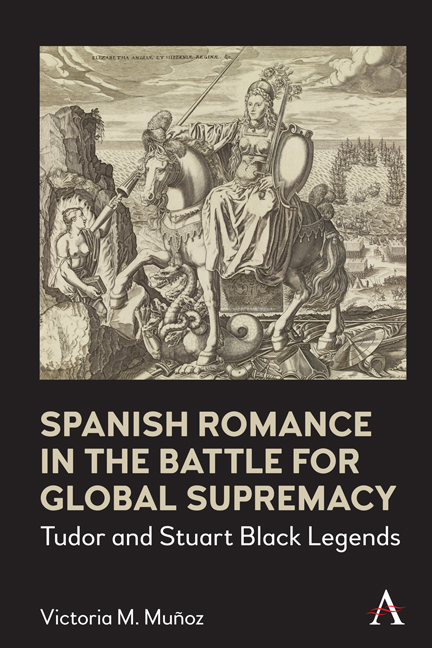Book contents
- Frontmatter
- Contents
- List of Figures
- Acknowledgments
- Prologue: Translating Romance, Empire, and Spain
- Chapter One “Books of the Brave” English: Spanish Tales of Love and Arms in Translation
- Chapter Two Dream Visions and Competing Dreams: Rewriting the Spanish Model in America
- Chapter Three Sun Kings and Moon Queens: The Courting and Uncourting of Spain
- Chapter Four Signs of England: Redcrosse Crosses the Ancient Boundary
- Chapter Five Believing Bottom’s Dream: Rationalizing Exploration from America to Australia
- Chapter Six Unruly Readers: Anti-Spanish Sentiment and the Feminizing of Romance
- Epilogue: Spanish Literature in England before Don Quixote
- Appendix I English Readership of Spanish Romance, By the Numbers
- Selected Bibliography
- Index
Chapter Four - Signs of England: Redcrosse Crosses the Ancient Boundary
Published online by Cambridge University Press: 22 February 2022
- Frontmatter
- Contents
- List of Figures
- Acknowledgments
- Prologue: Translating Romance, Empire, and Spain
- Chapter One “Books of the Brave” English: Spanish Tales of Love and Arms in Translation
- Chapter Two Dream Visions and Competing Dreams: Rewriting the Spanish Model in America
- Chapter Three Sun Kings and Moon Queens: The Courting and Uncourting of Spain
- Chapter Four Signs of England: Redcrosse Crosses the Ancient Boundary
- Chapter Five Believing Bottom’s Dream: Rationalizing Exploration from America to Australia
- Chapter Six Unruly Readers: Anti-Spanish Sentiment and the Feminizing of Romance
- Epilogue: Spanish Literature in England before Don Quixote
- Appendix I English Readership of Spanish Romance, By the Numbers
- Selected Bibliography
- Index
Summary
The fictional space of Spenser's faerieland represented a version of what the ancients imagined to lie beyond Thule: a space of boundless possibility and a mirror for civilization. The challenge for Spenser was to replace the historical feats of the Spanish and Portuguese in America, the world beyond the world limit, with those of the English privateers and early colonizers who were attempting to circumnavigate and circumvent the Habsburg control of these regions; this poetic politicizing of faerieland performed a Herculean labor in challenging the dominant narrative of Spain as God's chosen empire.
In Book I of The Faerie Queene, Spenser's characterization of the Red Cross Knight as an English Saint George prefigures the character's holy discipleship to King Arthur, a Christ figure who would assuredly “wynne the holy crosse” for England. Spenser's reclaiming the heraldic symbol of the red cross for England served this teleological narrative of the Second Coming, which cast the English as the protagonists in a divine doctrine of universal monarchy and Christian salvation. This process began with divorcing the red cross's contentious signification with Habsburg supremacy and the veritable confusion of crosses that had characterized the political iconography of early modern Europe. Spenser constructed a fictional mythology of England in faerieland, casting the English as the major protagonists of New World conquest and its chosen saviors. Mobilizing the red cross of Saint George as a sign of divine favor, he argued that the civilized British were destined to complete what the cruel Iberians had begun and that their final struggle for America would bring about the New Jerusalem in America.
Beyond Thule
venient annis saecula seris,
quibus Oceanus vincula rerum
laxet et ingens pateat tellus
Tethysque novos detegat orbes
nec sit terries ultima Thule.
—Lucius Annaeus Seneca, Medea-time shall in fine out breake
When Ocean waue shall open euery Realme.
The wandring World at will shall open lye.
And TYPHIS will some newe founde Land suruay
Some travelers shall the Countreys farre escrye,
Beyond small Thule, known farthest at this day.
—Medea, translation by John Studley (1581)Columbus was reportedly stirred to dreams of a westward voyage by the above passage from the first-century tragedy of Medea (lines 375–79) of the Hispano-Roman dramatist, Seneca.
- Type
- Chapter
- Information
- Spanish Romance in the Battle for Global SupremacyTudor and Stuart Black Legends, pp. 95 - 130Publisher: Anthem PressPrint publication year: 2021



